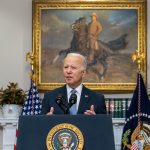President Biden’s use of executive privilege to withhold special counsel Robert Hur’s audio recording of their classified documents interview has generated backlash from Republicans and legal experts. This came after the president had previously waived his privilege over the interview transcript. The House Judiciary Committee was set to hold Attorney General Merrick Garland in contempt over the audio. However, at the last minute, Biden’s counsel and the Department of Justice revealed the president’s decision to claim executive privilege, citing the separation of powers to withhold the audio from Congress.
Biden’s executive privilege over Hur audio, but not transcript, draws scrutiny https://t.co/YffnBOS6Lo
— Washington Examiner (@dcexaminer) May 19, 2024
House Republicans expressed concern over the validity of Biden’s assertion, suggesting it was politically motivated and an attempt to sidestep scrutiny of the president’s mental acuity. They demanded access to the interview transcript, audio, and other materials after learning that Hur found Biden mishandled classified documents but chose not to prosecute him for it. Despite Biden declining to assert executive privilege over the report initially, the DOJ provided the transcript and most materials but withheld the audio.
Experts argue that since the president had authorized the release of the transcript, it’s likely he waived privilege over the audio recording. John Banzhaf, a public interest law professor, highlighted that the purpose of executive privilege is to allow candid discussions among the president and advisers, not to conceal potentially damaging information or protect political interests. He pointed out that the conversation in the transcript was between Biden and a law enforcement officer, not internal presidential deliberations.
Additionally, Tom Fitton, president of the conservative Judicial Watch, questioned the application of executive privilege in this context and announced plans to file a legal challenge. The controversy has led to discussions about holding Attorney General Garland in contempt of Congress, with the House Oversight hearing descending into chaos, further highlighting the partisan divide on the issue.
The House Judiciary and Oversight Committees passed contempt resolutions against Garland, indicating the deepening tensions between Congress and the executive branch. The Department of Justice has pushed back, asserting that releasing the audio could have a chilling effect on witnesses coming forward to law enforcement and emphasizing the longstanding position that an official who asserts the president’s executive privilege cannot be prosecuted for contempt. These developments have underscored the ongoing disputes between the branches of government and prompted legal and political wrangling over the scope and application of executive privilege.




